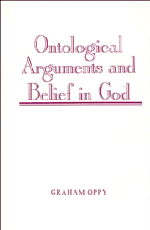Book contents
- Frontmatter
- Contents
- Preface
- Acknowledgments
- Ontological arguments and belief in God
- Introduction
- 1 Some historical considerations
- 2 Definitional arguments
- 3 Conceptual arguments
- 4 Modal arguments
- 5 Meinongian arguments
- 6 Experiential arguments
- 7 “Hegelian” arguments
- 8 Application to historical arguments
- 9 Are there (other) global objections to ontological arguments?
- 10 Is existence a predicate?
- 11 The uses of parody
- 12 Are ontological arguments of any use to theists and/or atheists?
- Conclusion
- Literature notes
- Bibliography
- Index
Conclusion
Published online by Cambridge University Press: 05 May 2010
- Frontmatter
- Contents
- Preface
- Acknowledgments
- Ontological arguments and belief in God
- Introduction
- 1 Some historical considerations
- 2 Definitional arguments
- 3 Conceptual arguments
- 4 Modal arguments
- 5 Meinongian arguments
- 6 Experiential arguments
- 7 “Hegelian” arguments
- 8 Application to historical arguments
- 9 Are there (other) global objections to ontological arguments?
- 10 Is existence a predicate?
- 11 The uses of parody
- 12 Are ontological arguments of any use to theists and/or atheists?
- Conclusion
- Literature notes
- Bibliography
- Index
Summary
On the basis of the discussion in Chapters 2-7,1 conclude that there are no ontological arguments that provide me with a good reason to believe that God - a being than which no greater can be conceived, a most perfect being - exists. Furthermore, though I have not emphasized this point, I also conclude that there are no ontological arguments that provide me with a good reason to believe that God - a being than which no greater can be conceived, a most perfect being - does not exist. The ‘ontological disproofs’ offered as parallels to the ‘ontological proofs’ are no more worthy of my acceptance, given that I start from a position of agnosticism.
More generally, on the basis of the argument in Chapter 8, I conclude that there are perfectly general grounds on which I can dismiss the possibility of a dialectically effective ontological argument. Only those who make the relevant presuppositions will suppose that some ontological arguments are sound; but there is nothing in ontological arguments that establishes a case for those presuppositions from the standpoint of those who do not share them.
I also note that there may be various other grounds on which each ontological argument can be dismissed.
- Type
- Chapter
- Information
- Ontological Arguments and Belief in God , pp. 198 - 199Publisher: Cambridge University PressPrint publication year: 1996



